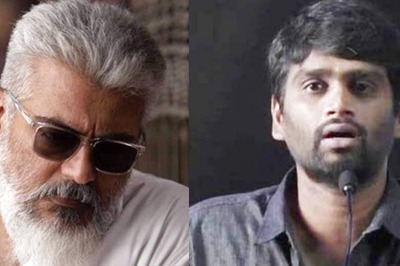
views
Beijing: As cash-strapped Pakistan approached the IMF for a bailout agreeing to share the details of huge Chinese loans obtained for the CPEC, a wary China on Monday said the global lender should "objectively and professionally" evaluate its investments and ensure that any financial package does not affect close ties between Beijing and Islamabad.
Pakistan Finance Minister Asad Umar told the media on Sunday that Islamabad is ready to share details of the debt related to the China-Pakistan Economic Corridor (CPEC) with the IMF as he formally sought a bailout package from the international lender.
Speaking in Islamabad on his return from Indonesia where he requested International Monetary Fund's Managing Director Christine Lagarde for a bailout package for Pakistan, Umar said the decision to approach the global lender was taken after consultations with friendly countries.
He said an IMF team is scheduled to arrive in Pakistan on November 7 to negotiate the programme, likely to span over a three-year period.
Reacting to the move by its all-weather ally Pakistan to approach the IMF for a bailout package, Chinese foreign ministry spokesman, Lu Kang said here that China wants an "objective and professional" evaluation of its loans to Pakistan by the IMF. The measures to be worked out by the IMF should not affect China-Pakistan relations, he said.
"As a member of the IMF, China supports the organisation having cooperation with Pakistan in objectively and professionally evaluating the situation on the ground in Pakistan," he said while answering questions on calls for scrutiny of Chinese loans by IMF and US officials.
"Also we support the IMF (helping Pakistan) in coping with the current difficulties. Their measures shall not affect normal bilateral cooperation between China and Pakistan," he said.
He said the CPEC projects have been undertaken by the two governments under the principle of "consultation and contribution for shared benefits". The project and financing arrangements are made by the two sides on equal consultation, he said.
"In fact, judging from the debt structure already released by the Pakistani government their debt incurred from the CPEC accounts for low proportion. So, it is not the reason for Pakistan's financial difficulties," he said.
Lu also said "China would like to work with Pakistan to substantiate and expand the CPEC projects and help Pakistan to achieve development on its own strength".
After the new Pakistan government led by Prime Minister Imran Khan took over, China has agreed to extend the CPEC projects to the restive Balochistan province to address criticism that only the dominant Punjab province has grabbed most Chinese investments.
India has also protested to China over CPEC as it traverses through Pakistan-occupied Kashmir (PoK). The entire project is stated to be worth around USD 60 billion.
On his recent visit to Pakistan, Chinese Foreign Minister Wang Yi said there were currently 22 cooperation projects in Pakistan within the framework of the CPEC of which nine have been completed and 13 are under construction. The total investment of the projects is to the tune of USD 19 billion.
A sense of unease prevailed in Beijing since the Khan-led government started taking a critical look at the CPEC projects in view of the difficult financial situation faced by Pakistan as well criticism over debt diplomacy being pursued by China by doling out excessive loans leaving countries in heavy debt.
Umar said Pakistan's current year debt repayments were about USD 9 billion but obviously, it would not entirely be available from the IMF.
Ahead of Umar's comments, both IMF and US officials spoke of concerns over the excessive loans obtained by Pakistan under the CPEC projects. The US said there was no rationale for the IMF to service Chinese debt and called for close scrutiny before extending a bailout package for Pakistan.
The Trump administration has been critical of China's Belt and Road Initiative, saying that it has saddled some developing countries with debts they cannot afford to repay. In July, US Secretary of State Mike Pompeo said there was "no rationale" for an IMF bailout to Pakistan to pay off Chinese loans to Islamabad.
On October 13, US State Department spokesperson Heather Nauert said Washington, a major stakeholder in the IMF, will examine closely Pakistan's request for loans, adding that "part of the reason that Pakistan found itself in this situation is Chinese debt".
"In all cases, we examine that closely from all angles of it, including Pakistan's debt position, in evaluating any type of loan programme," she said.
IMF's chief economist Maurice Obstfeld said China's involvement besides bringing development to Pakistan could also bring potential risks. "It is important that the design of the projects....be solid and excessive debts which cannot be repaid are avoided," he said.




















Comments
0 comment